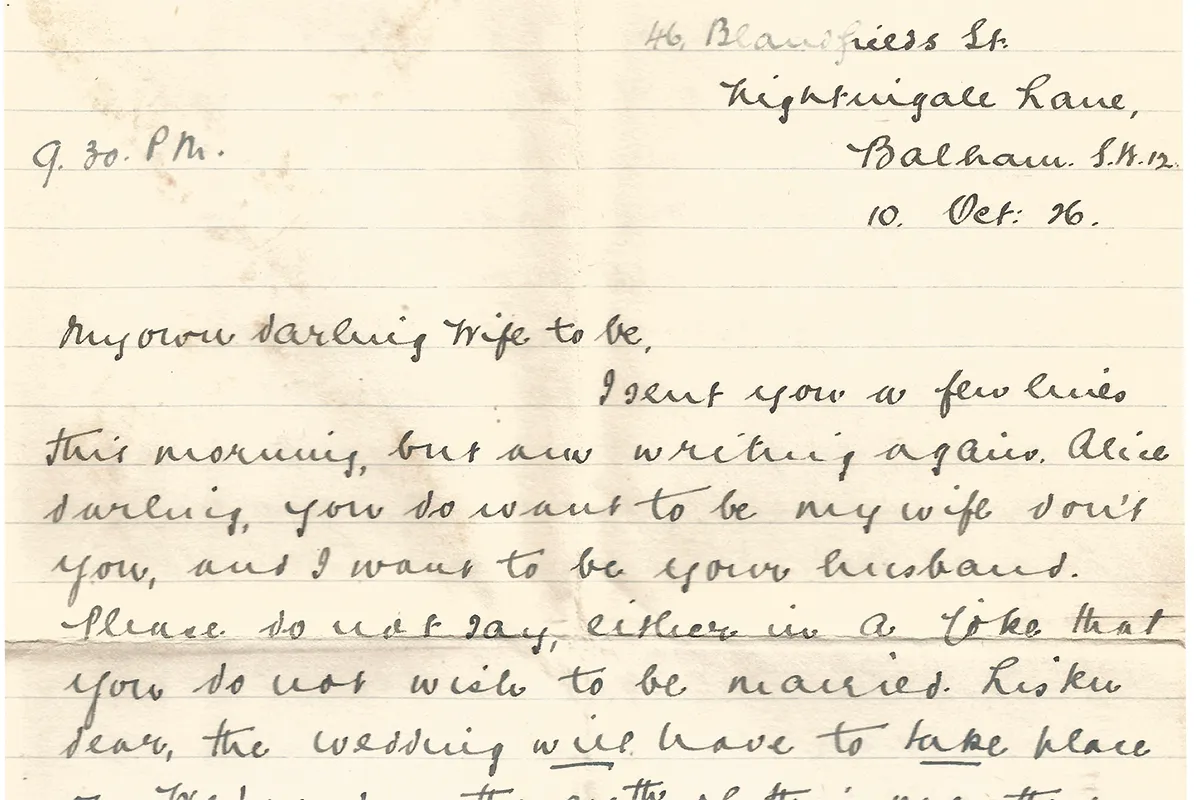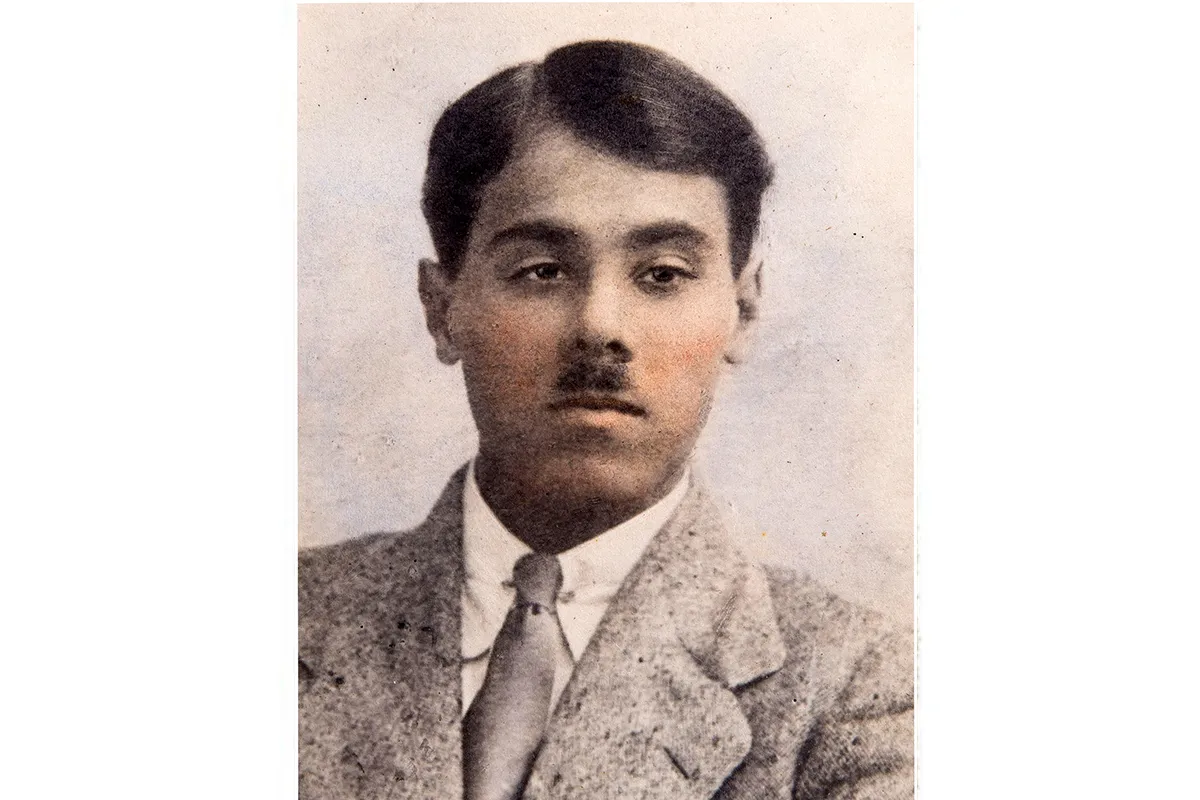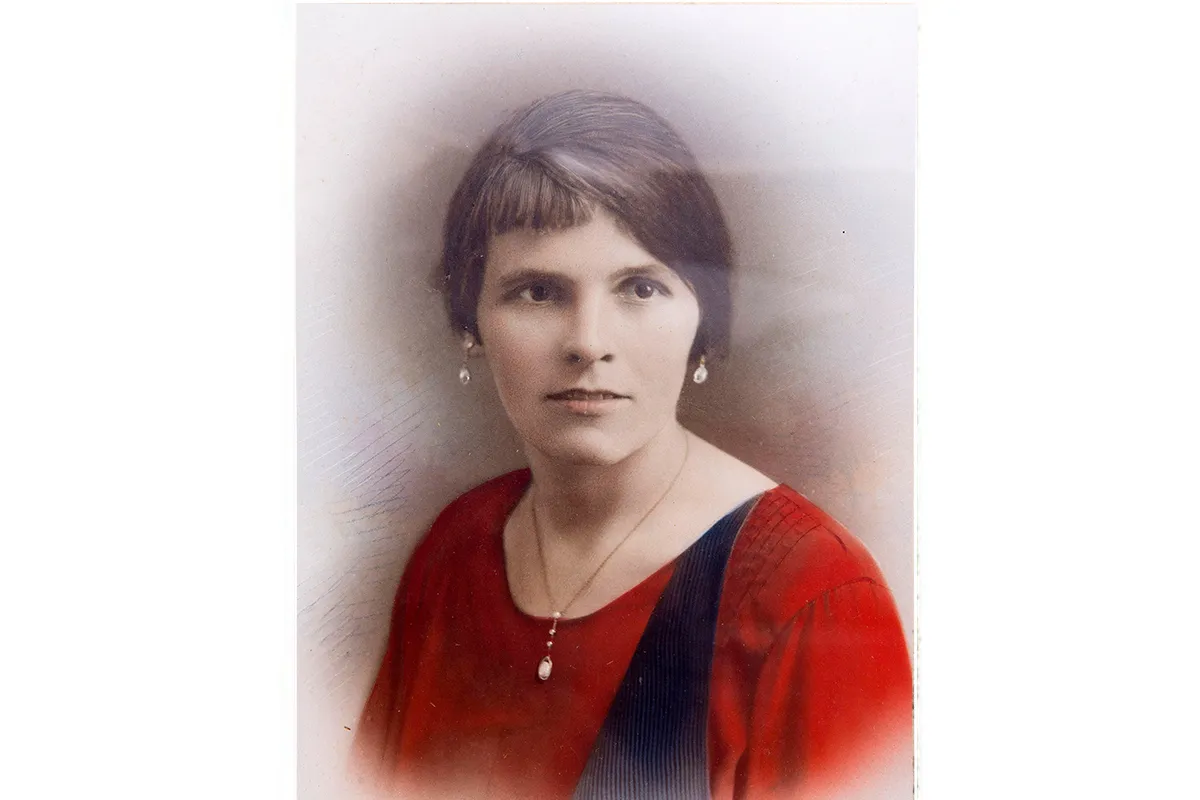Picture the scene: you receive a letter through the post, and as you open it rose petals cascade out. In the age of WhatsApp and text messaging, such romantic gestures seem to belong in bygone days. Through inheriting a collection of letters written in 1926, Sally George has uncovered the story of a passionate affair that prevailed despite family disapproval, jealousy and prejudice.
Sally, who lives in Beverley in the East Riding of Yorkshire, has been researching her family tree for 48 years. “The letters were written by my husband Steve’s paternal grandparents, Erroll George and Alice Jenkins.
“They were given to me in 2018, because I’m the family historian. Alice and Erroll didn’t like to throw things out, and their papers filled four suitcases and several boxes. They took up a whole room in our house.
“I started combing through the letters and putting them in order. Alice died before I married Steve, but I knew Erroll and we got on well. I thought I knew about their life together, but the letters revealed several surprises.”

Erroll was born in Calcutta (now Kolkata), India, and was of mixed race. His father James Robert George was descended from a captain in the Bengal Army and his ‘wife’ Begum Madhui, who was a member of Indian nobility. Erroll’s mother Evelina was the daughter of Michael Weathrall and a servant named Soondee.
“Erroll had a brother Cedric, who was 22 years his senior. They were raised in a world of servants and sedan chairs. Evelina died when Erroll was only six years old, which must have been devastating. He was sent to boarding school in Nainital, in the state of Uttarakhand, but ran away with his assistant and hid in one of the family’s homes for two months. As a punishment, he was sent away to Sevenoaks Grammar School in Kent.”
Erroll returned to Calcutta in 1920, and worked as a finance assistant in the Indian government’s Coal Department. His father James died in 1923, and Erroll returned to Britain where Cedric was already living. He found lodgings in London, and lived off an allowance that was left by his father.

“Erroll was quite the ‘man about town’, and spent his days going to the cinema, library and swimming pool. He found it difficult to find a job in Britain, which he blamed on prejudice,” Sally says.
Alice Jenkins was born in 1894 in Christchurch, Hampshire, where her father owned a hardware shop. She trained as a nurse and, after qualifying in 1925, began a long nursing career at Bexley Hospital, a psychiatric hospital in Dartford Heath, Kent.
“The letters revealed that Erroll and Alice were introduced to each other on 12 July 1926, by a mutual friend called Hilda Benny. I was amazed to discover that they married only four months later. No one in the family knew they’d had such a whirlwind romance.
“The first question that came to mind was, ‘Why did they marry so quickly?’ Could it have been because there was a shortage of men after the First World War? Alice must have known that the chances of her marrying were slim, so perhaps that is why she took a chance.”

One of Erroll’s letters revealed another reason for their alacrity. He was finding it hard to manage on his allowance, and his father’s will stipulated that he wouldn’t receive his inheritance until he married. James had left him £2,500, which would equate to over £106,000 now.
However, Sally doesn’t think that Alice married Erroll for his money, or that Erroll married Alice for his inheritance. “He had been engaged to a woman in India called Doris Hoare, but it didn’t work out. Also, the letters revealed that there had been a romance between Erroll and Hilda Benny, so he had a choice
of potential partners.
Naturally, Hilda was resentful when Erroll transferred his affections to Alice. A mutual friend Mr Krishna met Hilda on a London bus one day and wrote to Erroll saying, “I say, Hilda is jealous. She said to me, ‘I don’t think Jenki [her nickname for Alice] is knowing what she is doing, being a little too hasty.’ ”
Erroll resolved to be kind to Hilda, telling Alice, “I shall see Hilda for the last time today, at any rate for a while, but I must be on friendly terms with her, for it was she who brought about our meeting and it would seem funny if I turned nasty.”
The prejudice suffered by people of mixed race cropped up again. Erroll wrote that when he met Hilda, they couldn’t walk down his street because “the people in the road hate to see a coloured man out with a white girl, which they believe would only ruin her”.
“The people in the road hate to see a coloured man out with a white girl"
Clearly such prejudice was anathema to Alice. Their romance blossomed amid the leafy parks of South London, where they enjoyed picnics, strolls and kisses on her days off.
“I love the detail that the letters give about life in the 1920s. They had several postal collections and deliveries each day, which is hard to imagine now.” Alice writes of her nursing friend Queenie who returns from a three-week holiday and has had her hair ‘shingled’, which was the fashionable tapered bob of the time.
“My favourite letter has to be the one Erroll sent on 15 August 1926: ‘I send you in this letter a crushed red, red rose in all its purity and fragrance, as a token of my love.’ Soon after, Erroll and Alice became engaged, just five weeks after they were introduced.” Neither had met each other’s family yet.
"I send you in this letter a crushed red, red rose"
By this point Cedric was a retired government official living in Surrey “as a gentleman”. After the engagement, the couple went to visit him for the weekend, and it appeared to be a success.
Alice was keen for Erroll to see her family in Christchurch, but she couldn’t get two consecutive days off to travel. Instead, Erroll wrote a long letter of introduction to them, highlighting his lineage, prospects and devotion to Alice.
The couple exchanged a flurry of letters as they began to plan the wedding. Erroll bought Alice a diamond engagement ring and a “pretty velour coat with fur collar and cuffs to match, which can be your going away dress”.
As the costs began to mount, so did Erroll’s stress. A month before the wedding, he asked Cedric for an advance on his inheritance. Cedric refused, citing the fact that Erroll still hadn’t found a job.
“The two brothers clearly fell out because Cedric wrote to Alice’s father John saying, ‘Don’t let your daughter marry Erroll. He has no morals, no job and no money.’ John replied saying, ‘That doesn’t concern me.’
Cedric wrote to Alice’s father John saying, "Don’t let your daughter marry Erroll"
“Perhaps he was pleased that his daughter had found a potential husband at a time when so many women had to remain single. John still had two daughters living at home, Edith and Elsie, who never married.
“Erroll became increasingly stressed about money, and where they would live after the wedding. He couldn’t afford a suit, and was forced to go to the India Office in London with the banns and ask for an advance on his inheritance.
“It was such a relief to see that the wedding went ahead as planned on 27 October. They married at the Congregational Church in Christchurch, and the witnesses were John and Edith Jenkins. It seems unlikely that Cedric attended.”
Erroll used some of his inheritance to buy ‘Syringa’, a bungalow in the village of Abbotts Ann, near Andover. The couple had three children, Clive, Noel and Alan, who was Sally’s father-in-law.
“Erroll and Alice enjoyed a long and happy marriage, but it wasn’t without its difficulties. In 1929, Erroll lost his fortune in the Wall Street Crash, so Alice returned to nursing and Erroll worked as a clerk for the Air Ministry’s Directorate of Works at Amport House near Andover. It must have been a frightening time for them.”
Their married life revolved around family, work and the Church. “Alice passed away in 1970, which was devastating for Erroll. He found it deeply unfair that he had been left alone, and could be quite grumpy at times.”
Erroll died himself 16 years later. “He was passionate about genealogy during his lifetime, and that was an interest that we shared. The letters might have been lost to time otherwise.”
“It’s so important to keep such family documents,” Sally emphasises. “They’re historic ephemera, and a wonderful glimpse of past lives.”